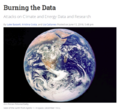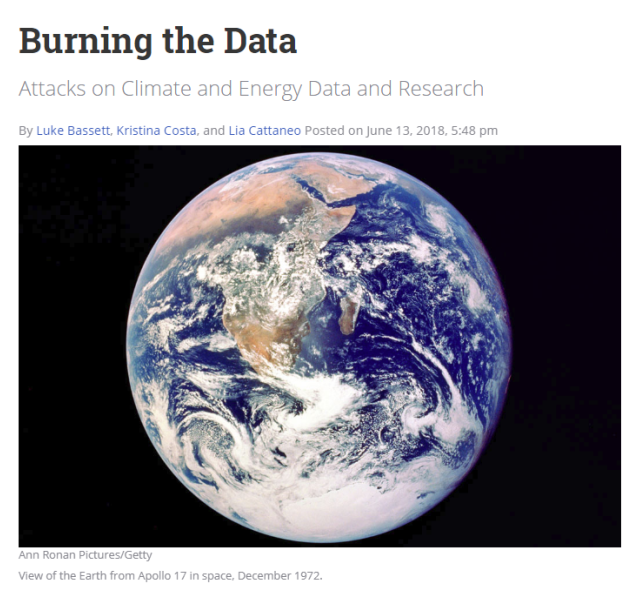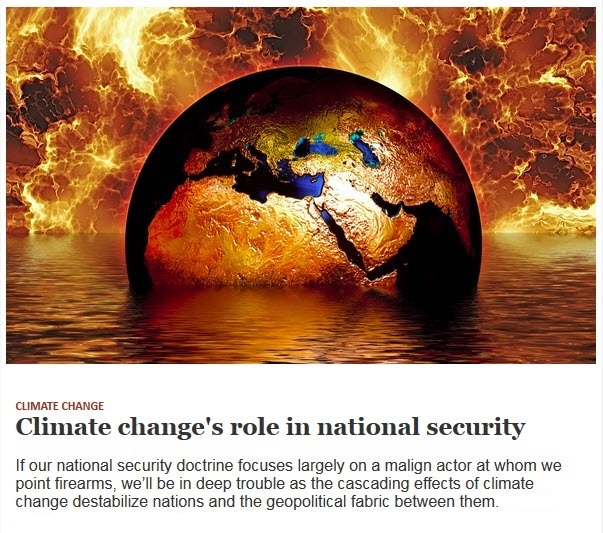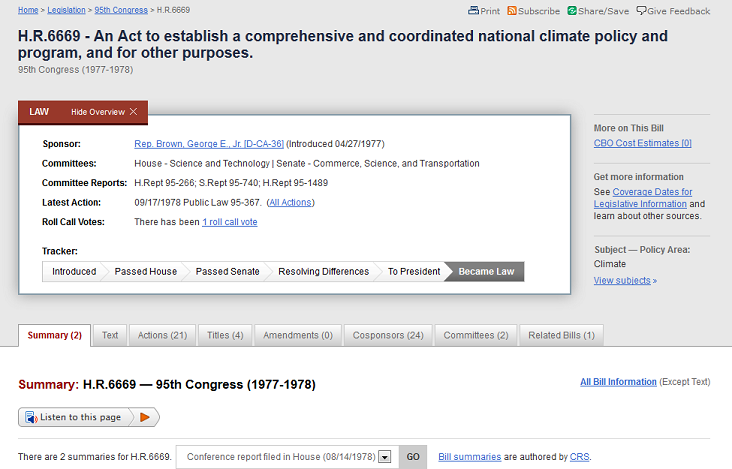File:Burning the Data.png
Burning_the_Data.png (640 × 597 pixels, file size: 434 KB, MIME type: image/png)
Attempting to block, delete and erase the facts and science
Earth Science / Environmental Security - Global Security
2016-2020
"It was as if they set out to burn the books"...
President Trump, his political appointees, and his congressional allies have repeatedly attacked federal programs that operate or fund climate and energy data and research....
The Trump administration’s budget proposals and explicit attacks on science, scientists, and scientific norms indicate their intent to undermine not just individual programs, but the entire scientific process, and in so doing cast doubt upon the severity of the climate challenge facing the United States and world...
2018 Report, Burning the Data
Since human-caused changes to the Earth’s climate were first identified in the late 1800s, the scientific community has continually advanced its understanding of the processes underlying observed changes, the potential impacts, and solutions.
Scientists are confident that we are living through the warmest period in human history and that human activities are the main cause of climate change.
Climate science has developed due in great part to the persistent, skeptical nature of the scientific method; the dedication and mission of its practitioners; and a bounty of data and analysis. New observations and data spark scientists to hypothesize, analyze, and draw conclusions, as well as feed additional study.
The U.S. Congress has long funded and defended this cycle of discovery (see 1970s legislative action below The National Climate Program Act, Public Law 95-367}. Since the 1970s a solid foundation of climate and energy data, earth science research have occurred supported on a bipartisan basis. Nonpartisan federal career staff have managed the programs; and scientists in government and academia have advanced their findings in the United States and abroad, underpinning the international understanding of and response to the climate challenge. These champions understand the benefits of the scientific endeavor and the urgent need to combat climate change.
The abundance of climate and energy data and their increasingly diverse sources, levels of precision, and wide range of practical applications have increased Americans’ understanding of the global climate system and benefitted users from a wide range of fields, including scientists, policymakers, business leaders, and farmers, among others.
Yet, this progress was summarily halted in 2016 by the incoming Trump administration in a break from the past.
President Trump and his allies sought nothing less than to 'burn the data', to end the studies, terminate the missions, the earth science research, to delete the climate information on government websites and to attack the validity of basic and applied research.
By targeting climate and energy data and research, the persistent, well-funded, industry-connected fringe of commentators, policymakers, and researchers who deny the science and reality of climate change sowed doubt about published and accepted research and sought to tear up the scientific apparatus, root and branch.
By creating gaps in data, forcing out the federal science workforce, changing how science is used to make decisions, and undermining the performance of federal scientific endeavors and partnerships, Trump and his allies seek to erode public confidence in climate science and in facts themselves.
Refusing to acknowledge that climate change poses unprecedented threats to the lives, livelihoods, security, and safety of the American people, these attacks on science were not just a matter of transparency or advocacy — the attacks were attacks on life and on survival.
Read the Burning the Data Report
Burning the Data / Endnotes
American Institute of Physics, “The Discovery of Global Warming,” available at https://history.aip.org/climate/timeline.htm (last accessed June 2018). ↩
D.J. Wuebbles and others, “Climate Science Special Report: Fourth National Climate Assessment, Volume I” (Washington: U.S. Global Change Research Program, 2017), available at
Andrew E. Dessler and Edward A. Parson, The Science and Politics of Global Climate Change: A Guide to the Debate (Cambridge, UK: Cambridge University Press, 2007). ↩
NOAA, “History of NOAA’s National Climatic Data Center,” available at https://www.ncdc.noaa.gov/sites/default/files/National-Climatic-Data-Center-History-Brochure-October-2014.pdf (last accessed May 2018); Norman A. Phillips, “The General Circulation of the Atmosphere: A Numerical Experiment,” Quarterly Journal of the Royal Meteorological Society 82 (352) (1956): 123–164, available at https://rmets.onlinelibrary.wiley.com/doi/abs/10.1002/qj.49708235202; Paul N. Edwards, “History of Climate Modeling,” WIREs Climate Change 2 (1) (2010): 128–139, available at https://onlinelibrary.wiley.com/doi/pdf/10.1002/wcc.95. ↩ Ibid. ↩
Lawrence Livermore National Laboratory, “The Atmosphere around Climate Models,” available at https://str.llnl.gov/december-2017/bader (last accessed May 2018). ↩
GreenPolicy Siterunner / SJS:
To understand the history of U.S. "National Climate Legislation", we must look to the beginnings of the U.S. climate science work in the 1970s.
Congressman George Brown, from Los Angeles, stood out, having trained in physics and as an engineer.
Your GreenPolicy360 siterunner became a friend, which grew over the years until the Congressman's death in 1999.
Please read about 'My friend George': https://www.greenpolicy360.net/w/George_E._Brown_Jr
Congressman Brown Out in Front of Climate Action
George Brown proposed and drafted the legislation of the first U.S. National Climate Program and shepherded its passage in 1978.
The National Climate Program Act, Public Law 95-367
- The first federal program established to study and assess scientifically the issues and risks of human-caused climate change.
At the Beginning of U.S. Science on Global Warming, Strategies & Planning
Energy and Climate Report, 1977, National Academy of Sciences / 175 pp. / PDF via GreenPolicy360
1978, the First Climate Actions
National Climate Program Act, Public Law 95-367
National Climate Program Act of September 1978
In 1979 came the first follow-on National Science Academy report. This study and report of national scientists was prescient and accurate in its global warming predictions.
A critically important understanding of the Congressman, that I remember his emphasizing over and over, was the need for "facts" -- he would say we need facts to guide our work, our policy work, our planning work and I will push and push and push the earth science and atmospheric science missions.
George believed that "data" was essential to sound decisions and in tackling the climate problem that was coming into view in the 1970s, he believed in his role on the science and technology, and space, committees that he would soon become chairman of and guide for years, that a database of facts, evidence, measuring and monitoring would provide the future generation with the knowledge base needed to make sound decisions. He was right on the mark, although he did not see the era that came into existence with the internet and spreading of mis- and dis-information.
'Today's social media and cyber-manipulation and -conflict, and deep online cyber-politics and cyber-warfare is now spreading, on multiple fronts, a barrage of bad data and as we see in the Trump years in office, a purposeful 'burning of the data'. The interruption of data gathering, science and facts, information and trendlines, is very dangerous and rises to the level of political malfeasance.
The struggles today, the dissension and, as Hannah Arendt described years ago, the belief that 'opinions are facts' and lies can be believed if told often enough, must be a priority to advance logic, reason, and democratic governance. These are challenging times in which we live...'
·······················································································
For the more detailed history on the efforts to build resources to confront the challenges today, here are details to review...
In 1987, Congress gave the Environmental Protection Agency and State Department authorities to develop climate change policy, shifting those activities from the Reagan White House. Despite signing the Global Climate Protection Act of 1987, then-President Ronald Reagan redirected management of climate research to White House Office of Science and Technology Policy’s Committee on Earth Sciences.
In 1990, a General Accountability Office investigation of progress on climate change research revealed the Reagan administration had neither coordinated national climate policy nor tasked an individual agency with doing so effectively. See National Climate Program Act 17 U.S.C. §2901-2908 (1978), available at https://www.gpo.gov/fdsys/pkg/USCODE-2011-title15/html/USCODE-2011-title15-chap56.htm; Foreign Relations Authorization Act, Fiscal Years 1988 and 1989, Public Law 100-204, 100th Cong., 1st sess. (December 22, 1987), available at https://www.gpo.gov/fdsys/pkg/STATUTE-101/pdf/STATUTE-101-Pg1331.pdf; Government Accountability Office, “Global Warming: Administration Approach Cautious Pending Validation of Threat,” GAO-90-63, Report to the Chairman, Subcommittee on Oversight and Investigations, Committee on Energy and Commerce, House of Representatives, January 1990, available at https://www.gao.gov/assets/150/148577.pdf; Global Change Research Act of 1990, Public Law 101-606, 101st Cong., 1st session. (November 16, 1990), available at https://www.gpo.gov/fdsys/pkg/STATUTE-104/pdf/STATUTE-104-Pg3096.pdf. ↩
The thirteen federal agencies include: the U.S. Department of Agriculture, U.S. Department of Commerce, U.S. Department of Defense, U.S. Department of Energy, U.S. Department of Health and Human Services, U.S. Department of the Interior, U.S. Department of State, U.S. Department of Transportation, U.S. Environmental Protection Agency, National Aeronautics and Space Administration, National Science Foundation, Smithsonian Institution, and U.S. Agency for International Development. See also Global Change Research Act of 1990, Public Law 101-606, 101st Cong., 1st sess. (November 16, 1990), available at https://www.gpo.gov/fdsys/pkg/STATUTE-104/pdf/STATUTE-104-Pg3096.pdf; U.S. Global Change Research Program, “About USGCRP: Legal Mandate,” available at https://www.globalchange.gov/about/legal-mandate (last accessed May 2018); U.S. Global Change Research Program, “Agencies,” available at https://www.globalchange.gov/agencies (last accessed May 2018). ↩
The National Climate Assessment documents the changes observed and projected for the United States due to climate change. The most recent National Climate Assessment issued a stark warning that climate change, while beneficial in some cases, threatens our way of life across every sector and region. Its development process involved more than 300 expert authors, a 60-member advisory committee, and many support staff. The USGCRP also convenes experts and issues reports on individual topics, including, for example, a 2016 report on the relationships between climate change and human health. In 1989, the first annual Our Changing Planet report definitively linked climate change to human activities; called for further research on the underlying biogeochemical and social processes that contribute to it; and supported international collaboration on climate and energy data, monitoring, and analysis.
The most recent report highlighted advances in understanding Earth processes driving observed trends as well as enhanced abilities to measure and forecast impacts with increasing regional and sectoral specificity. See also Global Change Research Act of 1990; U.S. Global Change Research Program, “Fourth National Climate Assessment Update: May 2018,” available at https://www.globalchange.gov/news/fourth-national-climate-assessment-update-may-2018-0 (last accessed May 2018); U.S. Global Change Research Program, “Reports Library,” available at https://www.globalchange.gov/browse/reports (last accessed May 2018); National Climate Assessment, “Climate Change Impacts in the United States,” available at https://nca2014.globalchange.gov/ (last accessed May 2018); U.S. Global Change Research Program, “The Impacts of Climate Change on Human Health in the United States: A Scientific Assessment,” available at https://health2016.globalchange.gov/ (last accessed May 2018); Our Changing Planet 1990; Our Changing Planet 2017. ↩
Although participating in USGCRP, the Department of Defense has not been included in the crosscut budget since fiscal year 1995. The State Department and the United States Agency for International Development (USAID) support USGCRP and the Climate Change International Assistance effort. In the past, some of this funding was counted towards the reported total for USGCRP (though not included in Figure 1); USGCRP now reports State and USAID funding, but considers them “Non-Add Agencies.” See Committee on Environment and Natural Resources Research, Our Changing Planet: The FY 1997 U.S. Global Change Research Program (Executive Office of the President, Office of Science and Technology Policy, National Science and Technology Council, 1996), available at https://downloads.globalchange.gov/ocp/ocp1997/ocp1997.pdf. ↩
The New York Times, “Read the Draft of the Climate Change Report,” August 7, 2017, available at https://www.nytimes.com/interactive/2017/08/07/climate/document-Draft-of-the-Climate-Science-Special-Report.html. ↩
D.J. Wuebbles and others, “Climate Science Special Report: Fourth National Climate Assessment, Volume I.” ↩ Chris Mooney and Juliet Eilperin, “In an Internal Memo, the White House Considered Whether to Simply ‘Ignore’ Federal Climate Research,” The Washington Post, May 23, 2018, available at https://www.washingtonpost.com/news/energy-environment/wp/2018/05/23/in-an-internal-memo-the-white-house-considered-whether-to-simply-ignore-federal-climate-research/. ↩
IPCC: Intergovernmental Panel on Climate Change, “History,” available at https://www.ipcc.ch/organization/organization_history.shtml (last accessed May 2018). ↩
Intergovernmental Panel on Climate Change, “Climate Change 2013: The Physical Science Basis” (2013), available at http://www.ipcc.ch/pdf/assessment-report/ar5/syr/AR5_SYR_FINAL_SPM.pdf ↩
Intergovernmental Panel on Climate Change, “Climate Change 2013: The Physical Science Basis” (2013) TFE.1, figure 2, page 44, available at http://www.ipcc.ch/pdf/assessment-report/ar5/wg1/WG1AR5_TS_FINAL.pdf. ↩
Intergovernmental Panel on Climate Change, “Climate Change 2013: The Physical Science Basis” (2013), figure TS.4, page 51, available at http://www.ipcc.ch/pdf/assessment-report/ar5/wg1/WG1AR5_TS_FINAL.pdf. ↩
Lawrence Livermore National Laboratory, “The Atmosphere around Climate Models.” ↩
Natasha Geiling, “The Enduring Climate Legacy of Mauna Loa,” Smithsonian Magazine, July 20, 2016, available at https://www.smithsonianmag.com/science-nature/enduring-climate-legacy-mauna-loa-180959859/; NOAA, “Earth System Research Laboratory, Global Monitoring Division: Welcome to Mauna Loa Observatory!”, available at https://www.esrl.noaa.gov/gmd/obop/mlo/ ↩
The White House, “Statement by President Trump on the Paris Climate Accord,” June 1, 2017, available at https://www.whitehouse.gov/briefings-statements/statement-president-trump-paris-climate-accord/. ↩
Paul Voosen, “Trump White House Quietly Cancels NASA Research Verifying Greenhouse Gas Cuts,” Science Magazine, May 9, 2018, available at http://www.sciencemag.org/news/2018/05/trump-white-house-quietly-cancels-nasa-research-verifying-greenhouse-gas-cuts. ↩
Partnership for Public Service, “Budget Roadmap: Managing Three Budgets Concurrently,” available at https://ourpublicservice.org/publications/download.php?id=1240 (last accessed May 2018); Bill Heniff Jr., Megan Suzanne Lynch, and Jessica Tollestrup, “Introduction to the Federal Budget Process” (Washington: Congressional Research Service, 2012), available at https://fas.org/sgp/crs/misc/98-721.pdf; James V. Saturno, Bill Heniff Jr., and Megan S. Lynch, “The Congressional Appropriations Process: An Introduction” (Washington: Congressional Research Service, 2016), available at https://www.senate.gov/CRSpubs/8013e37d-4a09-46f0-b1e2-c14915d498a6.pdf; Center on Budget and Policy Priorities, “Policy Basics: Introduction to the Federal Budget Process,” available at https://www.cbpp.org/research/policy-basics-introduction-to-the-federal-budget-process (last accessed May 2018). ↩
Pew Research Center, “Congress Has Long Struggled to Pass Spending Bills on Time,” available at http://www.pewresearch.org/fact-tank/2018/01/16/congress-has-long-struggled-to-pass-spending-bills-on-time/ (last accessed May 2018). ↩
The New York Times, “Government Shuts Down as Bill to Extend Funding is Blocked; Senate Adjourns for the Night,” January 19, 2018, available at https://www.nytimes.com/2018/01/19/us/politics/government-shutdown.html; Rachel Wolfe, “What’s affected – and what’s not – by the government shutdown,” Vox, January 22, 2018, available at https://www.vox.com/policy-and-politics/2018/1/20/16905508/government-shutdown-2018-open-closed-furloughs. ↩
Scott Waldman, “Trump Budget would Slash Science Across Agencies,” Scientific American, February 13, 2018, available at https://www.scientificamerican.com/article/trump-budget-would-slash-science-across-agencies/. ↩
Jack Fellows and others, “Warning Signs: Effects of Proposed Federal Funding Cuts to Environmental and Climate Research and Development Programs” (Santa Barbara, CA: Novim Group, 2017) ↩
U.S. Government Accountability Office, “Climate Change: Analysis of Reported Federal Funding” (2018), available at https://www.gao.gov/products/GAO-18-223. ↩
Authors’ calculations based on publicly available federal budget documents on file with the authors and available upon request. ↩
U.S. Geological Survey “Mission Areas: Land Resources,” available at https://www.usgs.gov/science/mission-areas/land-resources?qt-mission_areas_l2_landing_page_ta=0#qt-mission_areas_l2_landing_page_ta (last accessed May 2018); Office of Management and Budget, An American Budget: Budget of the U.S. Government, Fiscal Year 2019 (U.S. Government Printing Office, 2018), available at https://www.whitehouse.gov/wp-content/uploads/2018/02/budget-fy2019.pdf. ↩
U.S. Geological Survey, “Climate Adaptation Science Centers: About,” available at https://nccwsc.usgs.gov/content/about (last accessed May 2018); Landscape Conservation Cooperative Network, “Home,” available at https://lccnetwork.org/ (last accessed May 2018). ↩
Adam Aton, “Agency targets conservation co-ops to avoid climate rules,” E&E News ClimateWire, June 6, 2018, available at https://www.eenews.net/climatewire/2018/06/06/stories/1060083623. ↩
National Aeronautics and Space Administration, “Mission to Earth: Orbiting Carbon Observatory 3,” available at https://www.jpl.nasa.gov/missions/orbiting-carbon-observatory-3-oco-3/ (last accessed May 2018). ↩
National Oceanic and Atmospheric Administration, Budget Estimates: Fiscal Year 2018, Congressional Submission (U.S. Department of Commerce, 2017), available at http://www.corporateservices.noaa.gov/nbo/fy18_bluebook/FY18-NOAA-CJ.pdf. ↩
National Oceanic and Atmospheric Administration, Budget Estimates: Fiscal Year 2019, Congressional Submission (U.S. Department of Commerce, 2018), available at http://www.corporateservices.noaa.gov/nbo/fy19_bluebook/FY19-NOAA-CJ.pdf. ↩
Louis Jacobson, “How Much have Republicans Cut EPA Budget, Staff in Two Years?” PolitiFact, April 26, 2018, available at http://www.politifact.com/truth-o-meter/statements/2018/apr/26/evan-jenkins/how-much-have-republicans-cut-epa-budget-staff-two/. ↩
Environmental Protection Agency, Fiscal Year 2018: Justification of Appropriation Estimates for the Committee on Appropriations (U.S. Environmental Protection Agency, 2017), available at https://www.epa.gov/sites/production/files/2017-05/documents/fy-2018-congressional-justification.pdf; Environmental Protection Agency, Fiscal Year 2019: Justification of Appropriation Estimates for the Committee on Appropriations (U.S. Environmental Protection Agency, 2018) available at https://www.epa.gov/sites/production/files/2018-02/documents/fy-2019-congressional-justification-all-tabs.pdf; Environmental Protection Agency, “Learn about the Greenhouse Gas Reporting Program (GHGRP),” available at https://www.epa.gov/ghgreporting/learn-about-greenhouse-gas-reporting-program-ghgrp (last accessed May 2018).
Environmental Protection Agency, Fiscal Year 2018: Justification of Appropriation Estimates for the Committee on Appropriations; Environmental Protection Agency, Fiscal Year 2019: Justification of Appropriation Estimates for the Committee on Appropriations. ↩
Rebecca Hersher, “Climate Scientists Watch Their Words, Hoping To Stave Off Funding Cuts,” National Public Radio, November 29, 2017, available at https://www.npr.org/sections/thetwo-way/2017/11/29/564043596/climate-scientists-watch-their-words-hoping-to-stave-off-funding-cuts. ↩
Letter from University Committee on Academic Freedom to Janet Napolitano, May 9, 2018, available at https://senate.universityofcalifornia.edu/_files/reports/SNW-JN-UCAF-changes-science-funding.pdf. ↩
National Science Foundation, “Table 2. Graduate students in science in all institutions, by science field: 1975-2016,” available at https://ncsesdata.nsf.gov/gradpostdoc/2016/html/GSS2016_DST_02.html (last accessed June 2018). ↩
National Science Foundation, “FY 2018 Budget Request to Congress” (Alexandria, VA: National Science Foundation, 2017), available at https://www.nsf.gov/about/budget/fy2018/pdf/fy2018budget.pdf. ↩
Personal communications with staff at the Secretariat of the Intergovernmental Panel on Climate Change and the Secretariat of the World Meteorological Organization’s Global Climate Observation System, June 2018. ↩ United Nations Framework Convention on Climate Change, “Status of contributions as at 21 October 2016,” available at https://unfccc.int/sites/default/files/resource/docs/2016/sbi/eng/inf19.pdf (last accessed June 2018); United Nations Framework Convention on Climate Change, “Status of contributions as at 16 October 2017,” available at https://unfccc.int/sites/default/files/resource/docs/2017/sbi/eng/inf14.pdf?download (last accessed June 2018); United Nations Framework Convention on Climate Change, “Status of contributions as at 13 April 2018,” available at https://unfccc.int/sites/default/files/resource/inf06.pdf (last accessed June 2018); Statista, “Euro (EUR) to U.S. dollar (USD) annual average exchange rate from 1999 to 2017,” available at https://www.statista.com/statistics/412794/euro-to-u-s-dollar-annual-average-exchange-rate/ (last accessed June 2018). ↩ Assistant Secretary for Energy, Installations, and Environment, Fiscal Year 2017 Operational Energy Budget Certification Report (U.S. Department of Defense, 2017) ↩ Consolidated Appropriations Act, 2018, Rules Committee Print 115-66, 115th Cong. 2nd sess., available at https://www.gpo.gov/fdsys/pkg/CPRT-115HPRT29374/pdf/CPRT-115HPRT29374.pdf; Brady Dennis and Juliet Eilperin, “EPA Remains Top Target with Trump Administration Proposing 31 Percent Budget Cut,” The Washington Post, May 23, 2017, available at https://www.washingtonpost.com/news/energy-environment/wp/2017/05/22/epa-remains-top-target-with-trump-administration-proposing-31-percent-budget-cut/
NASA, “Sciences and Exploration Directorate, “ available at https://sciences.gsfc.nasa.gov/earth/index.cfm?fuseAction=projects.alphabetical&#apoint (last accessed May 2018). ↩ Paul Voosen, “Trump White House Quietly Cancels NASA Research Verifying Greenhouse Gas Cuts,” Science Magazine, May 9, 2018, available at http://www.sciencemag.org/news/2018/05/trump-white-house-quietly-cancels-nasa-research-verifying-greenhouse-gas-cuts. ↩ Tara Golshan, “Presidential rescission, the obscure way Trump wants to cut government spending, explained,” Vox, May 8, 2018, available at https://www.vox.com/policy-and-politics/2018/5/8/17316126/rescission-request-omb-trump-fiscal-budget. ↩
Letter from the White House to the Congress of the United States, May 8, 2018, available at https://www.whitehouse.gov/wp-content/uploads/2018/05/POTUS-Rescission-Transmittal-Package-5.8.2018.pdf. ↩ Golshan, “Presidential rescission, the obscure way Trump wants to cut government spending, explained.” ↩ Timothy Gardner and Emily Stephenson, “Trump Team Disavows Survey Seeking Names of Climate Workers,” Reuters, December 14, 2016, available at https://www.reuters.com/article/us-usa-trump-climatechange/trump-team-disavows-survey-seeking-names-of-climate-workers-idUSKBN1432JJ. ↩ Michael Lewis, “Inside Trump’s Cruel Campaign Against the USDA’s Scientists,” Vanity Fair, November 2017, available at https://www.vanityfair.com/news/2017/11/usda-food-stamps-school-lunch-trump-administration. ↩
Data Refuge, available at https://www.datarefuge.org/ (last accessed May 2018). ↩ Dana Varinsky, “Data on Climate Change Progress is Disappearing from the US State Department Website,” Business Insider, January 31, 2017, available at http://www.businessinsider.com/climate-action-reports-disappeared-2017-1. ↩
Environmental Data and Governance Initiative, “Changing the Digital Climate: How Climate Change Web Content is Being Censored Under the Trump Administration” (2018), available at https://envirodatagov.org/wp-content/uploads/2018/01/Part-3-Changing-the-Digital-Climate.pdf. ↩
Sharon Zhang, “The National Park Service has Scrubbed 92 Documents about Climate Change from its Website,” The New Republic, January 2018, available at https://newrepublic.com/minutes/146390/national-park-service-scrubbed-92-documents-climate-change-website. ↩
Chris Mooney, “EPA’s climate change website went down a year ago for ‘Updating.” It’s still not back,” The Washington Post, May 4, 2018, available at https://www.washingtonpost.com/news/energy-environment/wp/2018/05/04/it-has-been-more-than-a-year-since-epa-took-down-its-climate-website-for-updating/?utm_term=.472a05f516c2. ↩
Environmental Protection Agency, “This page is being updated,” available at https://www.epa.gov/sites/production/files/signpost/cc.html (last accessed June 2018). ↩
Environmental Protection Agency, “Climate Change 1/19/17 snapshot,” available at https://19january2017snapshot.epa.gov/climatechange_.html (last accessed June 2018). ↩
Environmental Data and Governance Initiative, “Changing the Digital Climate.” ↩
Juliet Eilperin and Lisa Rein, “Zinke Moving Dozens of Senior Interior Department Officials in Shake-Up,” The Washington Post, June 16, 2017, available at https://www.washingtonpost.com/politics/zinke-moving-dozens-of-senior-interior-officials-in-shake-up/2017/06/16/11801d3a-5295-11e7-b064-828ba60fbb98_story.html ↩
Joel Clement, “I’m a Scientist. I’m Blowing the Whistle on the Trump Administration,” The Washington Post, July 19, 2017, available at https://www.washingtonpost.com/opinions/im-a-scientist-the-trump-administration-reassigned-me-for-speaking-up-about-climate-change/2017/07/19/389b8dce-6b12-11e7-9c15-177740635e83_story.html?utm_term=.349dabcb39f9 ↩
Aria Bendix, “EPA Says Goodbye to Half Its Scientific Board,” The Atlantic, May 9, 2017, available at https://www.theatlantic.com/news/archive/2017/05/epa-dismisses-half-the-scientists-on-its-review-board/525909/. ↩
Scott Waldman, “EPA Fires Members of Science Advisory Board,” Science Magazine, May 6, 2017, available at http://www.sciencemag.org/news/2017/05/epa-fires-members-science-advisory-board. ↩
Brady Dennis and Juliet Eilperin, “Scott Pruitt Blocks Scientists with EPA Funding from Serving as Agency Advisors,” The Washington Post, October 31, 2017, available at https://www.washingtonpost.com/national/health-science/scott-pruitt-blocks-scientists-with-epa-funding-from-serving-as-agency-advisers/2017/10/31/959d91ac-be5a-11e7-959c-fe2b598d8c00_story.html. ↩
Michael Doyle and Brittany Patterson, “Climate Advisory Group Died Quietly,” E&E News, August 17, 2017, available at https://www.eenews.net/stories/1060058869. ↩
Lisa Friedman, “EPA Cancels Talk on Climate Change by Agency Scientists,” The New York Times, October 22, 2017, available at https://www.nytimes.com/2017/10/22/climate/epa-scientists.html ↩
Dan Elliott, “This US Wildfire Season is among the Worst: Here’s Why,” PhysOrg, September 8, 2017, available at https://phys.org/news/2017-09-wildfire-season-worst.html; Brittany Patterson, “Government Scientist Blocked from Talking about Climate and Wildfires,” Scientific American, October 31, 2017, available at https://www.scientificamerican.com/article/government-scientist-blocked-from-talking-about-climate-and-wildfires/. ↩
Brittany Patterson, “Government Scientist Blocked from Talking about Climate and Wildfires.” ↩
Sarah Kaplan, “Government Scientists Blocked from the Biggest Meeting in their Field,” The Washington Post, December 22, 2017, available at https://www.washingtonpost.com/news/speaking-of-science/wp/2017/12/22/government-scientists-blocked-from-the-biggest-meeting-in-their-field/ ↩
Lisa Friedman, Marina Affo, and Derek Kravitz, “EPA Officials, Disheartened by Agency’s Direction, are Leaving in Droves,” The New York Times, December 22, 2017, available at https://www.nytimes.com/2017/12/22/climate/epa-buyouts-pruitt.html ↩
Julian Borger, “Trump Drops Climate Change from US National Security Strategy,” The Guardian, December 18, 2017, available at https://www.theguardian.com/us-news/2017/dec/18/trump-drop-climate-change-national-security-strategy ↩
Caitlin Werrell and Francesco Femia, “Reaction: The New National Security Strategy and Climate Change,” The Center for Climate and Security, December 18, 2017, available at https://climateandsecurity.org/2017/12/18/reaction-the-new-national-security-strategy-and-climate-change/ ↩
Andrew Revkin, “Trump’s Defense Secretary Cites Climate Change as National Security Challenge,” ProPublica, March 2017, available at https://www.propublica.org/article/trumps-defense-secretary-cites-climate-change-national-security-challenge; Chris Mooney and Missy Ryan, “Pentagon revised Obama-era report to remove risks from climate change,” The Washington Post, May 10, 2018, available at https://www.washingtonpost.com/news/energy-environment/wp/2018/05/10/pentagon-revised-obama-era-report-to-remove-risks-from-climate-change/?utm_term=.aec6f691a410 ↩
Juliet Eilperin, “EPA now requires political aide’s sign-off for agency awards, grant applications,” The Washington Post, September 4, 2017, available at https://www.washingtonpost.com/politics/epa-now-requires-political-aides-sign-off-for-agency-awards-grant-applications/2017/09/04/2fd707a0-88fd-11e7-a94f-3139abce39f5_story.html ↩
Chelsea Harvey, “Trump team’s wonky CO2 calculation is a big deal,” E&E News, October 25, 2017, available at https://www.eenews.net/climatewire/stories/1060064593; Nina Heikkinen, “EPA Revises the Social Cost of a Potent Greenhouse Gas,” Scientific American, November 20, 2017, available at https://www.scientificamerican.com/article/epa-revises-the-social-cost-of-a-potent-greenhouse-gas/. ↩
Warren Cornwall, “Critics allege EPA’s new transparency rule has hidden pro-industry agenda,” Science Magazine, May 1, 2018, available at http://www.sciencemag.org/news/2018/05/critics-allege-epa-s-new-transparency-rule-has-hidden-pro-industry-agenda. ↩
G.D. Thurston and M.L. Bell, “The Human Health Co-benefits of Air Quality Improvements Associated with Climate Change Mitigation.” In Kent E. Pinkerton and William N. Rom, eds., Global Climate Change and Public Health (New York City: Humana Press, 2014), available at http://www.ccacoalition.org/en/resources/human-health-co-benefits-air-quality-improvements-associated-climate-change-mitigation ↩
Hannah Arendt, “Hannah Arendt: From an Interview,” The New York Review of Books, October 26, 1978, available at http://www.nybooks.com/articles/1978/10/26/hannah-arendt-from-an-interview/
○
Read more @GreenPolicy360:
○
File history
Click on a date/time to view the file as it appeared at that time.
| Date/Time | Thumbnail | Dimensions | User | Comment | |
|---|---|---|---|---|---|
| current | 17:26, 15 June 2018 |  | 640 × 597 (434 KB) | Siterunner (talk | contribs) |
You cannot overwrite this file.
File usage
- Additional Website Resources - Linked Data - Green Best Practices
- Atmospheric Science
- Climate Change
- Climate Policy
- Ecology Studies
- Eco-nomics
- Education
- Energy
- Environmental Protection
- Environmental Security
- Environmental Security, National Security
- Envirosecurity
- Global Security
- Global Warming
- Green Energy Initiatives
- GreenPolicy360
- Green Politics
- Health
- NASA
- National Security
- Natural Resources
- New Definitions of National Security
- NOAA
- Nuclear Nonproliferation
- Nuclear Proliferation
- Nuclear Weapons
- Peace
- Planet Citizen
- Planet Citizens
- Planet Citizens, Planet Scientists
- Renewable Energy
- Resilience
- Sea-Level Rise & Mitigation
- Strategic Demands
- Sustainability Policies
- ThinBlueLayer
- US Environmental Protection Agency



